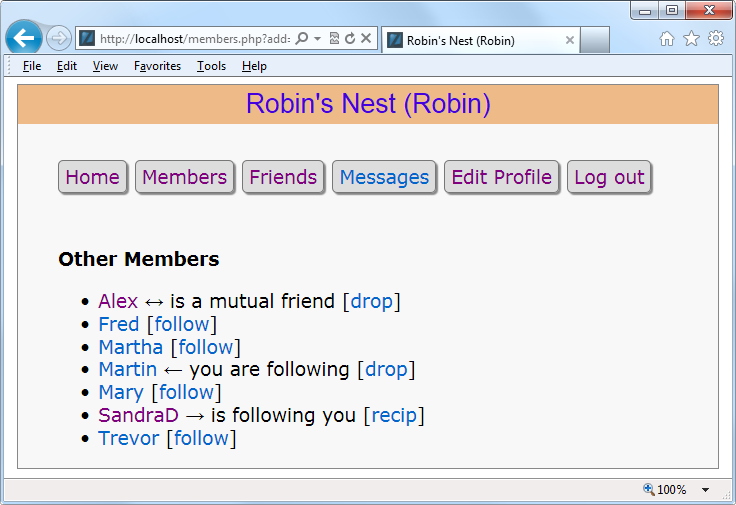members.php
Using Example 21-9, members.php, your users will be able to find other members and choose to add them as friends (or drop them if they are already friends). This program has two modes. The first shows a user’s profile, and the second lists all members and their relationships to you.
Viewing a User’s Profile
In the first mode a test is made for the GET variable 'view'. If it exists, a user wants to view
someone’s profile; the program does that using the showProfile function, along with providing a
couple of links to the user’s friends and messages.
Adding and Dropping Friends
After that the two GET
variables, 'add' and 'remove', are tested. If one or the other has
a value, it will be the username of a user to either add or drop as a
friend. This is achieved by looking up the user in the MySQL friends table and either inserting a friend’s
username or removing it from the table.
Of course, every posted variable is first passed through sanitizeString to ensure it is safe to use
with MySQL.
Listing All Members
The final section of code issues a SQL query to list all
usernames. The code places the number returned in the variable $num before outputting the page
heading.
A for loop then iterates
through each and every member, fetching their details and then looking
them up in the friends table to see
if they are either being followed by or are a follower of the user.
Anyone who is both a follower and a followee is classed as a mutual
friend.
The variable $t1 is nonzero
when the user is following another member, and $t2 is nonzero when another member is
following the user. Depending on these values, text is displayed after
each username showing that user’s relationship (if any) to the current
user.
Icons are also displayed to show the relationships. A double-pointed arrow means that the users are mutual friends, a left-pointing arrow indicates the user is following another member, and a right-pointing arrow indicates that another member is following the user.
Finally, depending on whether the user is following another member, a link is provided to either add or drop that member as a friend.
When you call up Example 21-9 in a browser, it will look like Figure 21-5. See how the user is invited to “follow” a nonfollowing member, but if the member is already following the user, a “recip” link to reciprocate the friendship is offered. In the case of a member the user is already following, the user can select “drop” to end the following.
<?php // members.php
include_once 'header.php';
if (!$loggedin) die();
echo "<div class='main'>";
if (isset($_GET['view']))
{
$view = sanitizeString($_GET['view']);
if ($view == $user) $name = "Your";
else $name = "$view's";
echo "<h3>$name Profile</h3>";
showProfile($view);
echo "<a class='button' href='messages.php?view=$view'>" .
"View $name messages</a><br /><br />";
die("</div></body></html>");
}
if (isset($_GET['add']))
{
$add = sanitizeString($_GET['add']);
if (!mysql_num_rows(queryMysql("SELECT * FROM friends
WHERE user='$add' AND friend='$user'")))
queryMysql("INSERT INTO friends VALUES ('$add', '$user')");
}
elseif (isset($_GET['remove']))
{
$remove = sanitizeString($_GET['remove']);
queryMysql("DELETE FROM friends WHERE user='$remove' AND friend='$user'");
}
$result = queryMysql("SELECT user FROM members ORDER BY user");
$num = mysql_num_rows($result);
echo "<h3>Other Members</h3><ul>";
for ($j = 0 ; $j < $num ; ++$j)
{
$row = mysql_fetch_row($result);
if ($row[0] == $user) continue;
echo "<li><a href='members.php?view=$row[0]'>$row[0]</a>";
$follow = "follow";
$t1 = mysql_num_rows(queryMysql("SELECT * FROM friends
WHERE user='$row[0]' AND friend='$user'"));
$t2 = mysql_num_rows(queryMysql("SELECT * FROM friends
WHERE user='$user' AND friend='$row[0]'"));
if (($t1 + $t2) > 1) echo " ↔ is a mutual friend";
elseif ($t1) echo " ← you are following";
elseif ($t2) { echo " → is following you";
$follow = "recip"; }
if (!$t1) echo " [<a href='members.php?add=".$row[0] . "'>$follow</a>]";
else echo " [<a href='members.php?remove=".$row[0] . "'>drop</a>]";
}
?>
<br /></div></body></html>Note
On a production server, there could be thousands or even hundreds of thousands of users, so you would probably substantially modify this program to include support for searching the “about me” text, paging of the output a screen at a time, and so on.
